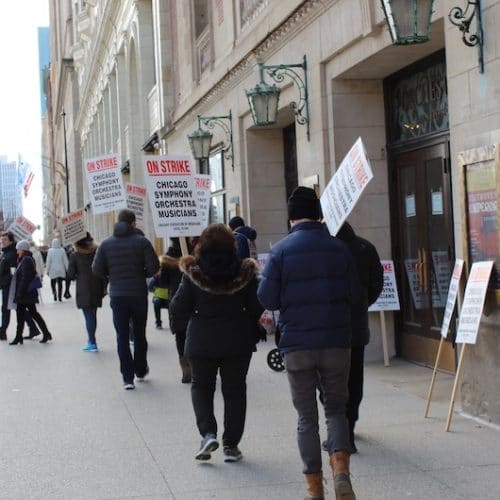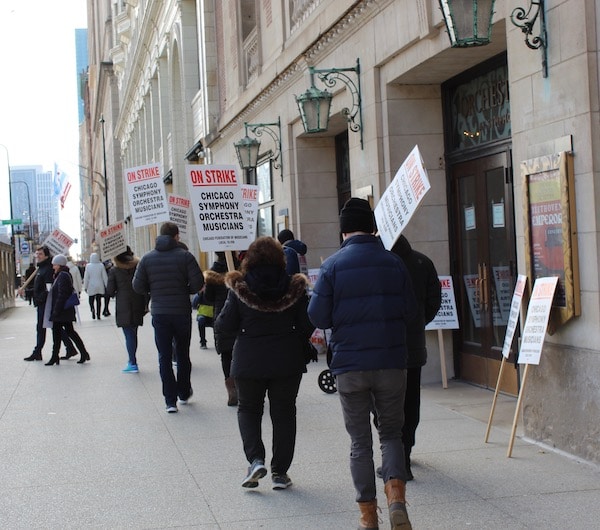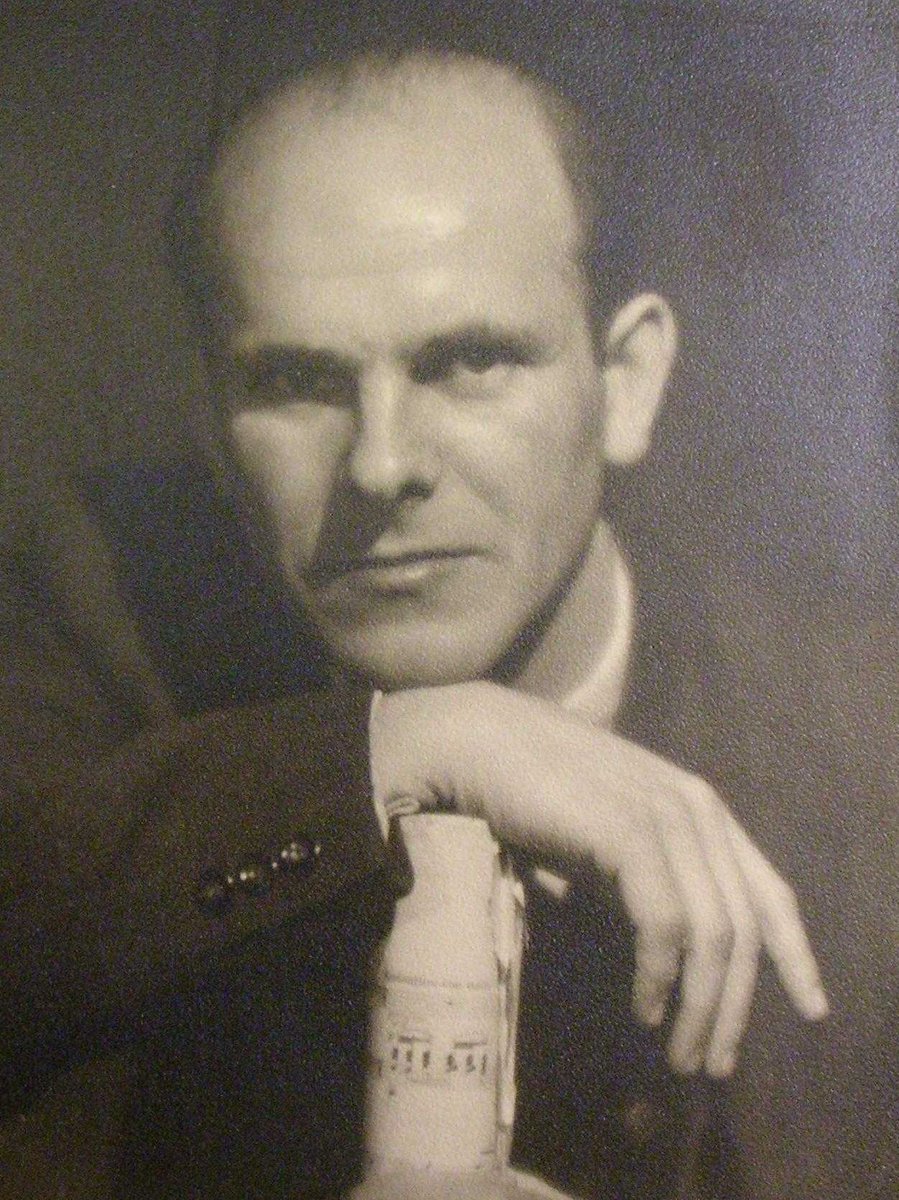Just in: Chicago cancels Salonen and Pollini
mainIt’s getting grimmer:
CHICAGO –The Chicago Symphony Orchestra Association has announced that CSOA-presented programs scheduled to take place at Symphony Center from Tuesday, March 26 through Tuesday, April 2 are canceled or postponed due to the ongoing strike by musicians of the Chicago Symphony Orchestra.
CSOA-presented concerts to be canceled include:
Symphony Center Presents Orchestras concert featuring the San Francisco Symphony with Music Director Michael Tilson Thomas and violinist Christian Tetzlaff on Tuesday, March 26, at 7:30 p.m.
CSO subscription concerts on Thursday, March 28, at 8:00 p.m., Friday, March 29, at 8:00 p.m., Saturday, March 30, at 8:00 p.m. and Tuesday, April 2, at 7:30 p.m. The program, which was to have been led by guest conductor Esa-Pekka Salonen, featured Strauss’ Also sprach Zarathustra and Bartók’s Bluebeard’s Castle with soloists Michelle DeYoung (mezzo-soprano) and John Relyea (bass).
The school performances on Friday, March 29 and family matinee performances on Saturday, March 30 of Flash Back, Flash Forward featuring Members of the Chicago Symphony Orchestra. This program was to have been led by guest conductor Scott Speck. It was created in part to celebrate the 100th season of the CSO’s series of concerts for children, and was set to feature pianist Yerin Yang, winner of the 2018 Crain-Maling CSO Young Artists Competition as soloist in Gershwin’s Rhapsody in Blue. More than 3,500 Chicago Public School (CPS) students were confirmed to attend the March 29 school concerts, with complimentary tickets and bus transportation provided by the CSOA, as part of the Negaunee Music Institute at the CSO’s 2018/19 season-long free ticket initiative for CPS.
Symphony Center Presents Piano concert featuring Maurizio Pollini in a program of works by Brahms, Schumann and Chopin on Sunday, March 31, at 3:00 p.m.
All associated pre-concert special events from March 26 through April 2 are also canceled.







Obviously, the Board is in this for the long haul, one does not propose changing the pension plan without anticipating a long, long strike by the orchestra.
The Board has an obvious exit strategy: bankruptcy protection. (Whether it has the guts to call it is another matter.)
Less clear is the exit strategy of the players, as their savings dwindle and the mortgage bill comes due, the kids’ tuition bills are on the way… You’ve already cancelled summer vacation, do you hang in there for 3 months, six, nine?
If you are making 175K/year in Chicago and live sensibly, you should be able to hold out for a long time. I feel sorry for middle class wagers. That’s tougher to hold out for a long stretch. Ideally we are supposed to have 6-12 months worth of income in savings, but I don’t know too many people who have that these days. I certainly understand management position, too.
Meanwhile, three of my concerts have been cancelled so far.
Bankruptcy is not an option.
The CSOA has a clean balance sheet and more assets than liabilities.
Depending on the liabilities that might need to be paid for high profile artists who have been booked years ahead, like Polinni and Salonen, they actually save money not having the orchestra on stage since it’s less money they have to raise to pay the fixed cost of the orchestra salaries.
Meanwhile, the orchestra is playing free concerts around town while the strike forces cancellations at their home base.
Doesn’t make much sense.
The CSO actually loses money every concert when you compare ticket sales vs cost of performance. I’m sure this factors into management’s strategy. Ticket sales only provide 31% of the CSO’s funding! They have to somehow raise $1 million PER WEEK from other sources. Wow.
I received a 50% discount for a CSO concert of my choice after seeing the Royal Concertgebouw Orchestra perform in February (it was my first Symphony Center), so I chose the Salonen concert because it included two infrequently performed pieces that I love. Naturally, I’m incredibly disappointed that I won’t be able to hear those pieces. I will always stand on the side of the musicians over management, but I surely hope that base compensation is not a primary cause of this strike.
Where do the musicians expect the CSOA to come up with $36,000,000 over the next 8 years to fund the Defined Benefit Pension Plan, on top of salary increases, paid vacations, travel expenses, etc? It’s very good to support the CSO musicians (which I do), but my company moved to a Defined Contribution Plan because salaries and life expectancy tables made this the only option for the future of the company. A transition program was in place; I’m sure the CSOA also is providing transition options to the musicians.
Well said on every point!
The defined contribution plan proposed by CSOA is actually 11 million dollars more expensive than keeping the current defined benefit pension plan!
See link for details
http://www.chicagosymphonymusicians.com/uploads/5/3/3/5/53356921/negotiations__pension_reality__pdf.pdf
It may be more expensive upfront for the first ten years, but it’s a long-term investment for the future and will prove to be more cost-effective for the institution in the long run.
It is only cost effective because the musicians will have to take a pay cut. Hence the strike.
Well, actually the musicians got CSO management to publicly acknowledge last week that the nominal expected cost to the CSOA of funding the current defined benefit plan over the next 10 years would be $ 11 million less than funding the proposed defined contribution plan. ($ 36.5 million vs. $ 47.5 million):
https://www.chicagotribune.com/entertainment/music/reich/ct-ent-cso-strike-update-0320-story.html
The issue seems to be that the defined benefit plan funding has more variability in expected cost to it than the defined contribution plan. The CSOA clearly wants to shift the risks entirely to the musicians.
As both a subscriber and as the current beneficiary of a defined benefit pension plan, I am solidly with the musicians on this. I say they need and deserve to be able to focus all of their attention on maintaining the highest caliber of their musicianship, rather than on managing their investment portfolios.
A lot of professionals of the highest caliber (doctors, attorneys…) maintain a laser focus on their careers yet still manage their personal investment portfolios.
I mean, what do the CSO musicians do with their normal savings, keep it under the mattress? No, they invest. Well, they can invest their retirement savings the same way.
Agreed. Plus, I think I remember reading that this shift in retirement plans would only affect new hires…it wouldn’t affect the players currently in the orchestra. But even if it does affect the current players, I’m sure the transition options are not as bad as the players claim.
I can tell you from experience that Pollini is over the hill; no loss there. The orchestra has to keep up this fight; a premier/flagship American cultural institution is worth preserving and its musicians are entitled to decent wages and conditions.
Last time I heard Pollini it was great. I would go see him until he stops. What a great artist.
Of course he’s a great artist. But some of his great talents lay with modern music. It would be nice if his programs included some Bartok, or something even more adventurous. More variety would help.
Good for you. I’ve heard him twice in recent years in Vienna and it was “ho hum” to say the least of it. His playing has always been on the brittle side anyway.
“Piano concert featuring Maurizio Pollini in a program of works by Brahms, Schumann and Chopin” . . . big surprise there. Yawn.
Salonen conducting “Bluebeard’s Castle” with Michelle DeYoung and John Relyea – that may be truly missing out on something.
This is getting serious.
Time for Mr. Riccardo Muti, along the lines of what the Nordic conductor did in Minny, to tell both sides to come to an agreement and for Chicago, in general, to pony up, or else he walks. That might bring management around. I don’t think they want to lose him.
This is my worst fear for potential outcomes of this strike…because while these CSO musicians are great (there’s no denying that), in essence, they are still replaceable. Even Maestro Muti himself said that no one player is “indispensable”… https://slippedisc.com/2016/05/chicago-principal-trumpet-to-play-next-season-with-ny-phil/
…but a great conductor like Maestro Muti doesn’t come around so often and cannot be replaced so easily—everything should be and needs to be done to keep him here. Because if he walks, this orchestra has effectively lost the one factor keeping it among the best in the world (it certainly isn’t the pension/retirement benefits keeping it the best…). Everyone knows that it is Maestro Muti that has turned this orchestra into an ensemble that can play the most sensitive of pianissimis, the most expressive of cantabile sections, etc….other great conductors have acknowledged this when they come to guest-conduct here in Chicago. The audience recognizes this as well as the hall is usually full when Maestro Muti comes to conduct, so they know that the concerts he leads are special.
Steve, Muti is a very good conductor but he’s not what makes the CSO special. The CSO has had lots of great conductors, like Barenboim, Solti, Reiner, etc. It’s the muscians AND their leader, and the city.
As an act of solidarity, Muti could contribute some of his $2 million salary to the players’ cause.
The Chicago Symphony (CSO) strike is not about the musicians having more money (they all make enough money to live on). The CSO strike is about keeping one of the best symphony orchestras in the world, in Chicago. The CSO needs to be able to keep its best musicians (who could work anywhere else in the world) and attract the best talent. Also, as the strike drags on, morale in the CSO worsens and orchestra donations become much harder to get (offsetting any financial gains from musician concessions). The Chicago Symphony has plenty of money (hundreds of millions in the bank), the artistic (not financial) future of the orchestra is at stake.
No, it’s about coming to a compromise that both sides can live with. The rest is secondary.
Musicians striking over pension benefits. Bad time and place to do so. Both the city Chicago and state of Illinois have almost comically mishandled their pension schemes for retiring employees. One estimate has the state falling one hundred and fifty billion dollar short. That money has to come from somewhere – the taxpayers, most of whom do not have pensions of their own to look forward to. Hence the steady exodus from the state of both taxpayers (potential CSO ticket buyers) and business (potential donors). Downtown Chicago is booming at the moment prompting the quip that the city is one-third San Francisco surrounded by two-thirds Detroit. This imbalance will shift as the steady stream of tax refugees becomes a gushing torrent. The CSO management will most likely cave and as a result raise ticket prices so my days sitting in the upper balcony are pretty much over. Orchestral musicians work hard for their money but so do state employees as well as Wall Street bankers. From my perspective, down at the bottom of the economic totem pole, they all look pretty much the same.
Thanks for offering us your perspective all the way from Schaumburg, Greg. /s
The immediate problem is that no active negotiations are occurring. About two weeks ago, the musicians made an offer that they viewed as a compromise. The CSOA flatly rejected the offer, offered no compromise in return and has not made a counter offer since. The ball is in the court of the CSOA, and they need to make a compromise offer.